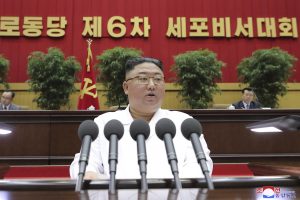In January, speaking at the 8th Congress of the Workers’ Party of Korea, North Korean General Secretary Kim Jong Un called the U.S. his country’s “biggest enemy.” Certainly, for as long as North Korea refuses to engage seriously with the U.S. on denuclearization, the strict economic sanctions imposed by the U.N. Security Council are going to remain in place. So even though Pyongyang extracted a promise of economic cooperation from South Korean President Moon Jae-in three years ago, South Korea cannot act on this promise until the sanctions are lifted.
In short, progress in relations between North and South Korea is predicated on progress in North Korea’s relations with the United States. This holds equally true for Japan-North Korea relations. In this sense, North Korea’s disdain for Japan and South Korea as powers kept on a tight leash by Washington is not entirely without grounds.
At the first Japan-North Korea summit meeting in 2002, then-Prime Minister Koizumi Junichiro and Chairman of the National Defence Commission Kim Jong Il agreed that “they would make every possible effort for an early normalization of the relations.” Yet subsequent relations between the two countries actually deteriorated further over the issue of Japanese people abducted by North Korea.
Proud of his record as Japan’s longest-serving prime minister, former Prime Minister Abe Shinzo made the abduction issue one of his administration’s most important priorities and declared again and again that “my mission will never end until the day comes when families of all abduction victims are able to embrace their children with their own arms.” Yet Abe did not manage to return even one abductee and was unable to arrange a single summit meeting.
Interestingly, since the beginning of this year, Kim Jong Un has sent numerous congratulatory messages to the General Association of Korean Residents in Japan (known as Chongryon). This organization is a pro-North Korea group comprising North Korean citizens living in Japan. It operates almost 100 elementary, junior high, and high schools, with Korea University at the apex.
During the Kim Il Sung era, Chongryon was valued as a money spinner because it sent large amounts of money to North Korea over many years. However, as Chongryon grew weaker and the amount of money it sent dwindled, Pyongyang’s attitude toward it gradually cooled.
Kim Jong Un has reversed this approach, and has consistently sent extremely warm messages to Chongryon. This warmth may be explained by the fact that Kim Jong Un’s mother was a North Korean resident of Japan who was born in Osaka. Undoubtedly, Kim has an interest in Japan. Moreover, if Pyongyang could normalize diplomatic ties, it would be able to get its hands on $10 billion from Japan as de facto war reparations. Although any resumption of dialogue is going to be elusive, Japan continues to hold potential appeal for North Korea.
While the North Korean media repeatedly criticizes the administration of Japanese Prime Minister Suga Yoshihide, Kim has begun to appeal for friendship and goodwill with the Japanese people and is starting to explore grass-roots exchanges. Clearly, he is trying to improve, however gradually, the Japanese image of North Korea, which has been severely tarnished by the triple whammy of abductions, nuclear weapons and missile launches.
As though heeding this call, on March 10, a nonpartisan group of legislators promoting the normalization of relations with North Korea met in Tokyo for the first time in three years and mentioned the possibility of allowing a delegation to visit North Korea. However, North Korea continues to enforce strict measures to contain COVID-19 and travel to North Korea is for now prohibited.
North Korea is home to many Japanese besides abduction victims. In addition to the so-called “Japanese wives” – Japanese women who migrated to North Korea with their Korean husbands during the exodus of Zainichi Koreans from Japan in the 1960s – there are also Zanryu-Nihonjin, Japanese who lived in North Korea before 1945 and have been unable to return for more than 70 years.
The Japanese government alone has the potential to bring its people home. For this to happen, negotiations with Pyongyang are essential. To pave the way for negotiations, the Japanese government would have to offer some sort of economic incentive to North Korea, just as Prime Minister Koizumi Junichiro resolved to do. However, public opinion in Japan today will not allow for any concessions and, at any rate, Suga has his hands full dealing with COVID-19 and the Tokyo Olympics.
North Korea has declared that it will not participate in the Games, which begin in less than three months. The reality is that the Suga administration has passed up whatever slim chance it had to resume dialogue between Japan and North Korea and is ultimately intent only on cooperation with the Biden administration. Japanese living in North Korea waiting impatiently to return look set to be abandoned again.

































